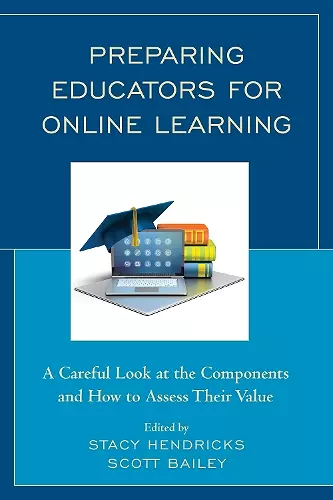Preparing Educators for Online Learning
A Careful Look at the Components and How to Assess Their Value
Scott Bailey editor Stacy Hendricks editor
Format:Hardback
Publisher:Rowman & Littlefield
Published:11th Jan '16
Currently unavailable, and unfortunately no date known when it will be back
This hardback is available in another edition too:
- Paperback£35.00(9781475822502)

Designed for administrators and human resources professionals responsible for hiring educators, Preparing Educators for Online Learning offers a compelling look into the world of online educator preparation. As more and more educator preparation programs move part or all of their training online, hiring professionals need insight into the design and characteristics of quality online programs and how those translate into quality prospective employees. Framed by viewpoints and commentary from practicing administrators and HR specialists, as well as online professors and students, Preparing Educators for Online Learning , offers an explication of the components of a quality online program, research related to the effectiveness of online training, assessments for quality candidates, possible hiring guidelines and interview approaches, and commentary on the implications for educators, including higher education institutions and PK-12 schools, both now and going forward.
This text, developed by scholars from Stephen F. Austin State University in Texas, is designed ‘to give practicing administrators, human resource professionals, and teachers and students in university education preparation programs insights into the continuous development of quality online training components.’ Beth Gound describes the positive aspects and concerns of hybrid and online learning environments. Hendricks and Bailey evaluate the perception that online learning comes from diploma mills, fosters low-quality preparation, isolates students, and is unreliable because of cheating. Bailey counters that ‘online learning is equally effective as other instructional methods’ and ‘has gained a solid foothold in the educational system.’ Hendricks and Pauline Sampson suggest that quality online teacher education programs use various online tools and field experiences to maintain personal connections among students and teachers and, M. C. Breen adds, to build interpersonal dispositions, skills, and professionalism. Reflections from a graduate student, an eProfessor, and school administrators on the changing perceptions, challenges, and effectiveness of online learning precede Janet Tareilo’s review of the financial implications of online learning, Hendricks’s advice on hiring candidates trained online, and Tracey Covington Hasbun’s discussion of the growing significance of online learning in K–12 settings. Summing Up: Recommended. Upper-division undergraduates through faculty and practitioners. * CHOICE *
Preparing Educators for Online Learning: A Careful Look at the Components and How to Assess Their Value Acknowledgments provides us with a practical view into online education. The authors address the importance of relevant, high quality learning experiences that prepare future educators for the challenges faced in today’s schools. This book provides a refreshing look at the benefits and the positive impact online teaching has had on education. The book provides us with a comprehensive look at the structure and benefits of online education from PK-12 to higher education. The authors present a compelling case for students and practicing educators to trust the quality of online programs and the effectiveness with which online programs can develop educators’ capacity. Preparing Educators for Online Learning: A Careful Look at the Components and How to Assess Their Value Acknowledgments is a must-read book for aspiring educators as well as current principals and central administrators responsible for hiring school personnel. -- Yanira Oliveras-Ortiz, PhD, The University of Texas at Tyler
Having served as Superintendent of Schools in bothTexas and Oklahoma, and having served as an instructor of both traditional and online higher education courses, I appreciate the efforts of these authors regarding online programs/courses. Students today desire more and more online opportunities, and higher education institutions are moving in that direction rapidly. But, as this book appropriately points out, decision-makers must consider all potential benefits and challenges when making decisions about online courses - not the least of which are: policies, procedures, and financial implications.I recommend this book without reservation. -- Darrell G. Floyd, PhD, superintendent, Enid Public Schools, Enid, Oklahoma
As online instructional programs continue to expand nationwide in Colleges of Education as well as across academic disciplines, this book demystifies the components of quality online instruction for both university professors and K-12 school practitioners. The authors provide current research and thorough critiques of both the advantages and disadvantages of online learning while illuminating through rich, descriptive examples the ways that disadvantages can be alleviated and benefits maximized to promote exemplary learning opportunities for future school administrators and teachers. For professors engaged in online teaching or ones who are planning to embark on this journey, this book serves as an invaluable resource. -- Betty J. Alford, PhD, professor of educational leadership at Cal Poly Pomona and professor emeritus at Stephen F. Austin
ISBN: 9781475822496
Dimensions: 239mm x 160mm x 20mm
Weight: 467g
194 pages